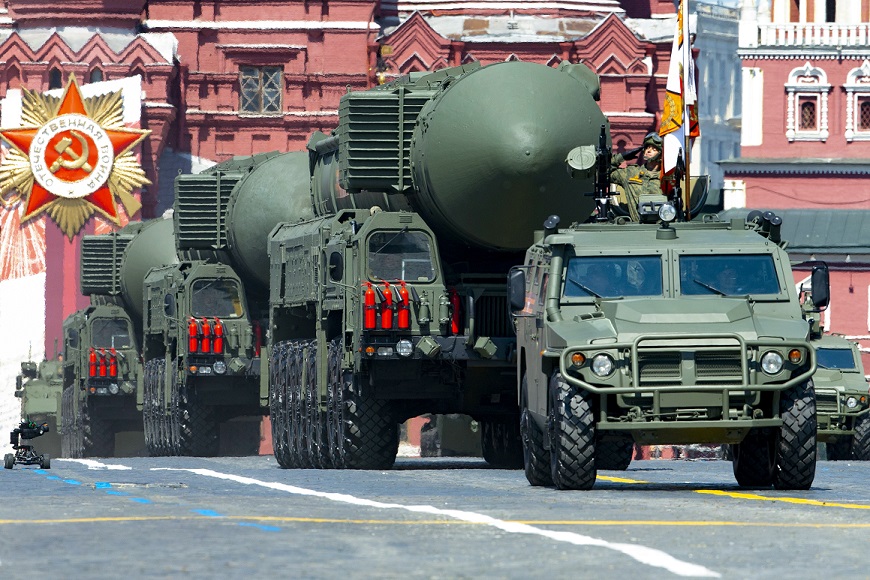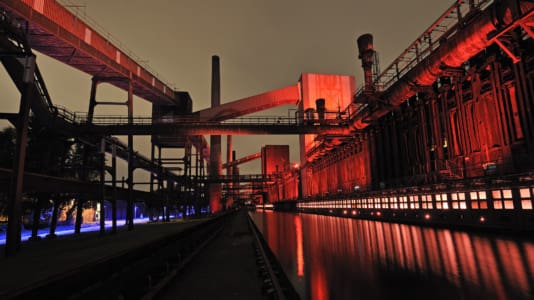While the possible use of a nuclear weapon seems closer after the events of recent weeks, from a strategic and domestic perspective, it would not make sense for Vladimir Putin to follow through on recent threats, according to nuclear weapons expert and security analyst Michal Smetana.
In an interview with Echo24, the Charles University academic spoke of the Russian public’s strong opposition to the use of nuclear weapons and said there is no reason to believe that the alleged “nuclear train” was transporting nuclear weapons, insisting the entire construction of this media-friendly story was based on very dubious foundations from the beginning.
Smetana also talked about the recent deployment of the nuclear submarine Belgorod. “Nuclear submarines and their surfacing are certainly something that the United States and NATO allies, in general, are watching quite closely; it’s a potentially important indicator.
“However, I would still be cautious about making any big conclusions. This alone is unlikely to indicate any significant change in Russia’s determination to use nuclear weapons in Ukraine,” Smetana told the news outlet.
“Nuclear weapons on submarines are primarily intended for a retaliatory nuclear strike, especially the Poseidon nuclear torpedo, which is often mentioned in this context today. However, Russia may, for example, use a submarine for a demonstrative test of this new system — but in such a case it will undoubtedly be without a nuclear warhead,” he added.
Answering the question of how Russian society views the possible use of nuclear weapons, Smetana noted that public opinion is not the only or the most important indicator of whether Vladimir Putin would use nuclear weapons:
“In the research itself, we came to a finding that may seem paradoxical. Russians like their nuclear weapons as a symbol of Russian greatness. They are proud of them and see them as an important aspect of Russia as a world power. However, they perceive the use of nuclear weapons very critically. That aversion is very high in our research. We have worked with various experimental scenarios in which, for most Russians, nuclear weapons are an option they would like to avoid. Most Russians would even rather be in a situation where Russia is threatened with military defeat in a regional conflict than use nuclear weapons.”
According to Smetana, the attitudes could, however, change dramatically in the case of Moscow itself being attacked or someone else using nuclear weapons against Russia first.
“We have just worked with scenarios in which NATO is involved militarily. In this variant, we have seen a very strong aversion to using nuclear weapons, even in the case of purely demonstrative nuclear explosions, for example, somewhere over the sea. We did not work with the Ukrainian scenario itself, but it is even more likely that using them, for example in the context of the Ukrainian attack, on the newly annexed territories, which most of Russian society does not perceive as part of Russia and has no strong emotional relationship with them, would probably be difficult for Russian society to accept. In the case of Crimea, the question mark is bigger, but it is still true that the aversion to using nuclear weapons is high in Russian society, and there is a strong preference for using other weapon systems.”
Smetana notes that the research data came from before the war when people were not afraid and did not expect possible punishment in case of any answers contrary to Russian government policy. The representative sample consists of 1,500 respondents.
“Current research in Russia is much more problematic in this regard. Indeed, you as a Russian have a great incentive not to participate in research at all, or to hide your true preference because it poses a personal risk to you. However, even in such limited recent research, we see that the Russians overwhelmingly reject the use of nuclear weapons in Ukraine.”
Ascribing the issues of Russia’s conventional forces to its nuclear arsenal is a mistake
Describing the state of the Russian nuclear arsenal, Smetana claims that some people make the mistake of extrapolating from partial reports of problems existing in Russia’s conventional arsenal to the level of nuclear forces and assuming it must be the same.
“This is the wrong approach,” the academic said. “In Russia, the nuclear arsenal has a very privileged position. We are in a very late phase of two decades of comprehensive modernization of the Russian nuclear arsenal that replaced old Soviet-made systems with new systems. In the framework of the Russian defense budget, huge funds come into this area in the long term. Although in absolute numbers they are smaller than those of the United States, in relative terms compared to conventional weapons, the means are higher,” he explained.
In Smetana’s view, that is the result of Russia having to deal with the decline of its conventional forces at the end of the Cold War. One of the steps to cope with the decline was the decision to give more importance to nuclear forces.
“Of course, we don’t know the details of all the Russian systems, but if we look at the reliability of the Russian strategic missiles, for which we have test data, the reliability is very, very high. Independently maintaining nuclear warheads and bombs without using nuclear tests is a technological challenge for every nuclear state, including the United States. We have no reason to believe that Russia is lagging or that any significant part of its arsenal is inoperable,” Smetana said.
He concluded that it currently does not make much sense for Russia to use nuclear weapons.
“The reason why many analysts and governments are paying so much attention to this is the fact that even if the probability is still relatively small, it is still a step with potentially dramatic consequences.
The impacts would be enormous not only in terms of the number of victims, but for the precedent it would set, Smetana explained. “For both the United States and Russia, since the days of the Cold War, one of the biggest strategic priorities has been to prevent the use and further spread of nuclear weapons. That would open a ticket to a very different, new world, which all current nuclear states are trying to prevent in the long term. Even states like China or India could significantly change their policy towards Russia because of such a step. The Kremlin is undoubtedly very worried about such political consequences.”
Smetana warned that should the West find itself in a situation in which Vladimir Putin would consider that his regime could fall because of the development of the situation in Ukraine, his strategic calculation may change. “It is true that if nuclear weapons were to be used against Ukraine, there would likely be a series of steps that we would very likely see first, whether it concerns physical movement within the nuclear force structure or escalation of nuclear threats.”






